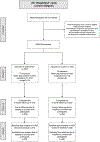Addressing weight gain in smoking cessation treatment: a randomized controlled trial
- PMID: 23113779
- PMCID: PMC7147975
- DOI: 10.4278/ajhp.110603-QUAN-238
Addressing weight gain in smoking cessation treatment: a randomized controlled trial
Abstract
Purpose: To evaluate the effectiveness of a cognitive behavioral treatment (CBT) addressing cessation-related weight concerns delivered via a tobacco quitline that does not address weight concerns.
Design: Randomized controlled trial, blinded 6-month follow-up.
Setting: The Oklahoma Tobacco Helpline (OKHL).
Subjects: All 7998 smokers who called the OKHL were screened; 4240 were eligible; 2000 were randomized to the standard quitline (STD) or the brief version of the CBT weight concerns program (WCP).
Intervention: Telephone counseling to help people quit smoking and address concerns about cessation-related weight gain.
Measures: Demographics, weight, tobacco status, weight concerns, self-efficacy in quitting, and quitting without weight gain.
Analysis: Descriptive statistics and logistic regression.
Results: Of those randomized, 1002 participants completed the 6-month survey (response rates = 53.2% for STD, 47% for WCP). Compared with STD, WCP led to reduced weight concerns (p < .01) and less weight gain among quitters (1.8 vs. -3.4 pounds; p = .01). Although not significant, participants in the WCP were more likely to report 30-day abstinence (33.3% vs. 36.8%, p = .24; intent to treat = 17.7 vs. 17.3).
Conclusion: The WCP was successfully delivered via a quitline and resulted in improved attitudes about weight and decreased cessation-related weight gain without harming quit rates. Promotion of a quitline focused on addressing weight in conjunction with quitline treatment for smoking cessation may improve cessation and weight outcomes. Study limitations include use of self-report and survey response.
Trial registration: ClinicalTrials.gov NCT01162577.
References
-
- Finkelstein EA, Fiebelkorn IC, Wang G. National medical spending attributable to overweight and obesity: how much, and who’s paying? Health Aff (Millwood). 2003;Suppl Web Exclusives:W3–219–W3–226. - PubMed
-
- Freedman DM, Sigurdson AJ, Rajaraman P, et al. The mortality risk of smoking and obesity combined. Am J Prev Med. 2006;31:355–362. - PubMed
-
- Dall TM, Zhang Y, Chen YJ, et al. Cost associated with being overweight and with obesity, high alcohol consumption, and tobacco use within the military health system’s TRICARE prime-enrolled population. Am J Health Promot. 2007;22:120–139. - PubMed
-
- Zhu S, Anderson CM, Tedeschi GJ, et al. Evidence of real-world effectiveness of a telephone quitline for smokers. N Engl J Med. 2002;347:1087–1093. - PubMed
-
- Fiore MC, Jaen CR, Baker TB, et al. Treating Tobacco Use and Dependence: 2008 Update. Clinical practice guideline. Rockville, MD: US Dept of Health and Human Services, Public Health Service; 2008.
Publication types
MeSH terms
Associated data
Grants and funding
LinkOut - more resources
Full Text Sources
Medical
Research Materials


